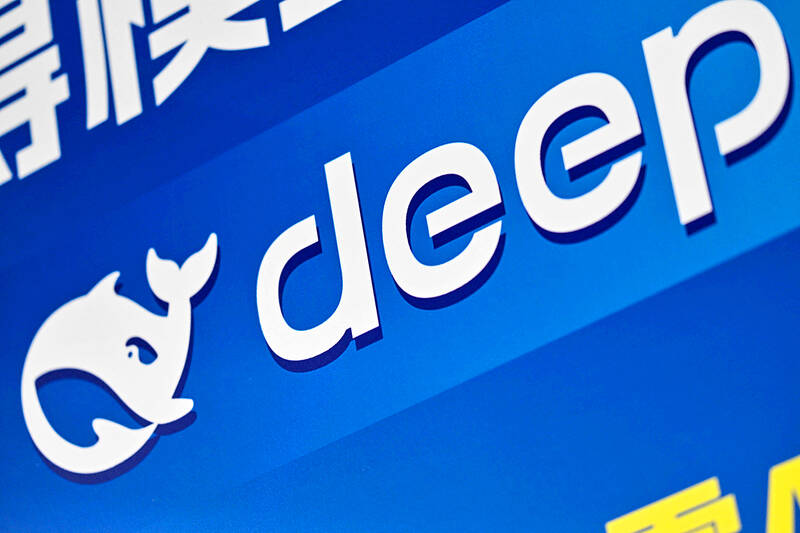Chinese artificial intelligence (AI) sensation DeepSeek plans to release key code and data to the public starting next week, an unusual step to share more of its core technology than rivals such as OpenAI have done.
The 20-month-old start-up, which surprised Silicon Valley with the sophistication of its AI models last month, plans to make its code repositories available to all developers and researchers.
That would allow anyone to download and build on or improve the code behind the well-regarded R1 or other platforms, it said in a post on X.

Photo: AFP
OPEN SOURCE
With the move, DeepSeek is pushing harder on an open-source approach to AI development that has won more advocates since its models outperformed OpenAI and Meta Platforms Inc competitors in benchmark tests.
Companies such as Meta already make their models available to the public, allowing users to customize the platform for their own applications. OpenAI began as partially open source, but it has since retreated from that mission.
DeepSeek says it intends to go further by publicizing the underlying code, the data used to create it, and the way it develops and manages that code.
WIDER ADOPTION
It could also escalate a race between the US and China to develop ever-more advanced AI models. By making its coding secrets freely available, DeepSeek is helping to ensure wider adoption of its technology, which is already spurring concerns about security among governments from the US to Australia.
“We’re a tiny team exploring AGI [artificial general intelligence]. Starting next week, we’ll be open-sourcing 5 repos, sharing our small but sincere progress with full transparency,” DeepSeek announced on X yesterday.
A code and data repository is a digital storage space where the data and resources needed for training, running, and evaluating AI models are organized and managed. The Hangzhou, China-based start-up said its technology has been fully tested, deployed and documented.
DeepSeek’s surprising progress has forced larger, more established rivals like Baidu Inc (百度) to adopt the open-source framework, but global competitors such as OpenAI and Anthropic PBC still keep their AI models, repositories and data proprietary.
Investors in the biggest US AI start-ups, such as Anthropic and xAI, have plowed tens of billions of US dollars into the industry in the hope of a big payday.
DeepSeek, which emerged out of a quantitative hedge fund run by founder Liang Wenfeng (梁文鋒), has so far not revealed outside backing and could face less pressure to build a revenue model.
“No ivory towers — just pure garage-energy and community-driven innovation,” the start-up said on X.

Real estate agent and property developer JSL Construction & Development Co (愛山林) led the average compensation rankings among companies listed on the Taiwan Stock Exchange (TWSE) last year, while contract chipmaker Taiwan Semiconductor Manufacturing Co (TSMC, 台積電) finished 14th. JSL Construction paid its employees total average compensation of NT$4.78 million (US$159,701), down 13.5 percent from a year earlier, but still ahead of the most profitable listed tech giants, including TSMC, TWSE data showed. Last year, the average compensation (which includes salary, overtime, bonuses and allowances) paid by TSMC rose 21.6 percent to reach about NT$3.33 million, lifting its ranking by 10 notches

Popular vape brands such as Geek Bar might get more expensive in the US — if you can find them at all. Shipments of vapes from China to the US ground to a near halt last month from a year ago, official data showed, hit by US President Donald Trump’s tariffs and a crackdown on unauthorized e-cigarettes in the world’s biggest market for smoking alternatives. That includes Geek Bar, a brand of flavored vapes that is not authorized to sell in the US, but which had been widely available due to porous import controls. One retailer, who asked not to be named, because

SEASONAL WEAKNESS: The combined revenue of the top 10 foundries fell 5.4%, but rush orders and China’s subsidies partially offset slowing demand Taiwan Semiconductor Manufacturing Co (TSMC, 台積電) further solidified its dominance in the global wafer foundry business in the first quarter of this year, remaining far ahead of its closest rival, Samsung Electronics Co, TrendForce Corp (集邦科技) said yesterday. TSMC posted US$25.52 billion in sales in the January-to-March period, down 5 percent from the previous quarter, but its market share rose from 67.1 percent the previous quarter to 67.6 percent, TrendForce said in a report. While smartphone-related wafer shipments declined in the first quarter due to seasonal factors, solid demand for artificial intelligence (AI) and high-performance computing (HPC) devices and urgent TV-related orders

MINERAL DIPLOMACY: The Chinese commerce ministry said it approved applications for the export of rare earths in a move that could help ease US-China trade tensions Chinese Vice Premier He Lifeng (何立峰) is today to meet a US delegation for talks in the UK, Beijing announced on Saturday amid a fragile truce in the trade dispute between the two powers. He is to visit the UK from yesterday to Friday at the invitation of the British government, the Chinese Ministry of Foreign Affairs said in a statement. He and US representatives are to cochair the first meeting of the US-China economic and trade consultation mechanism, it said. US President Donald Trump on Friday announced that a new round of trade talks with China would start in London beginning today,